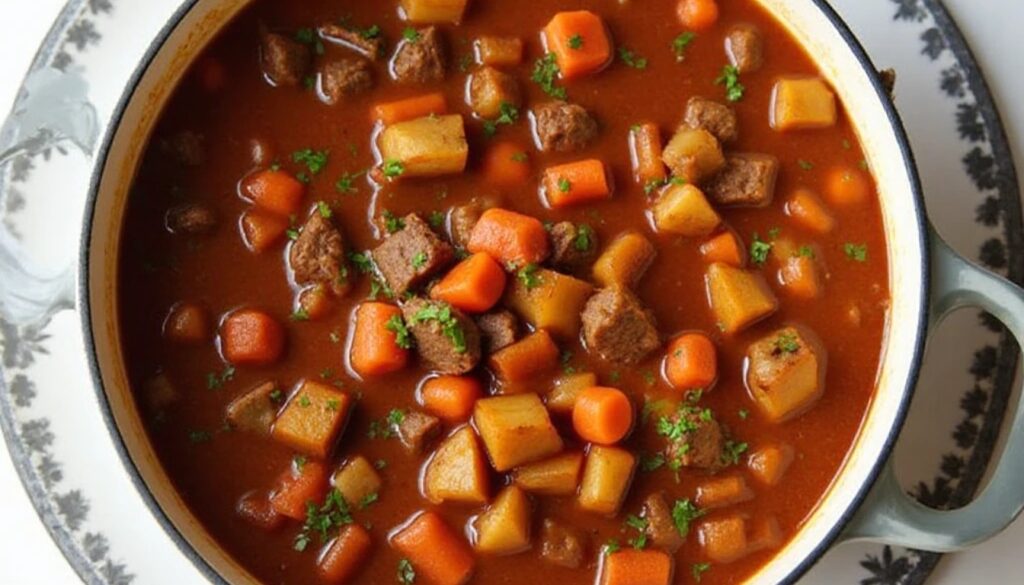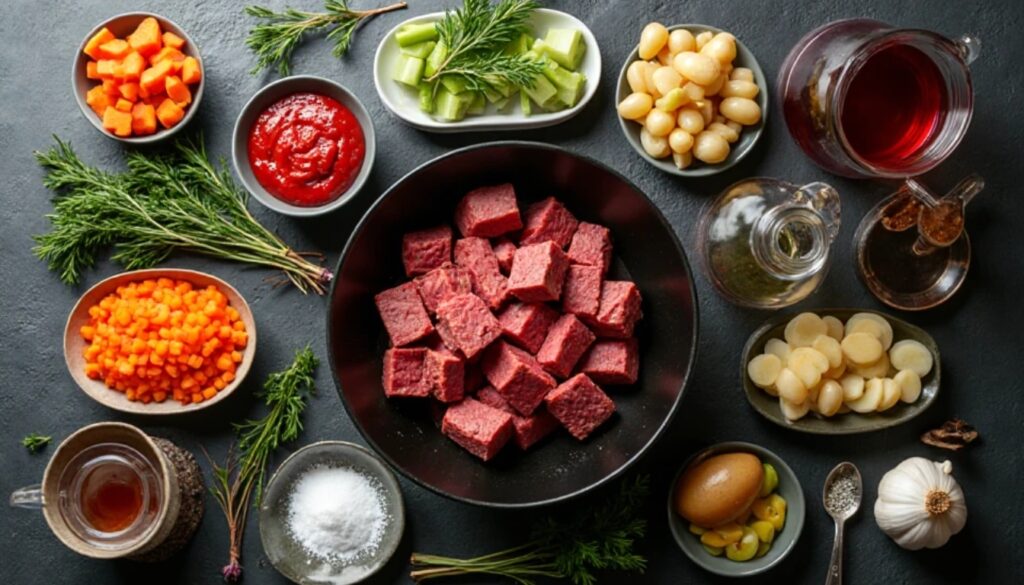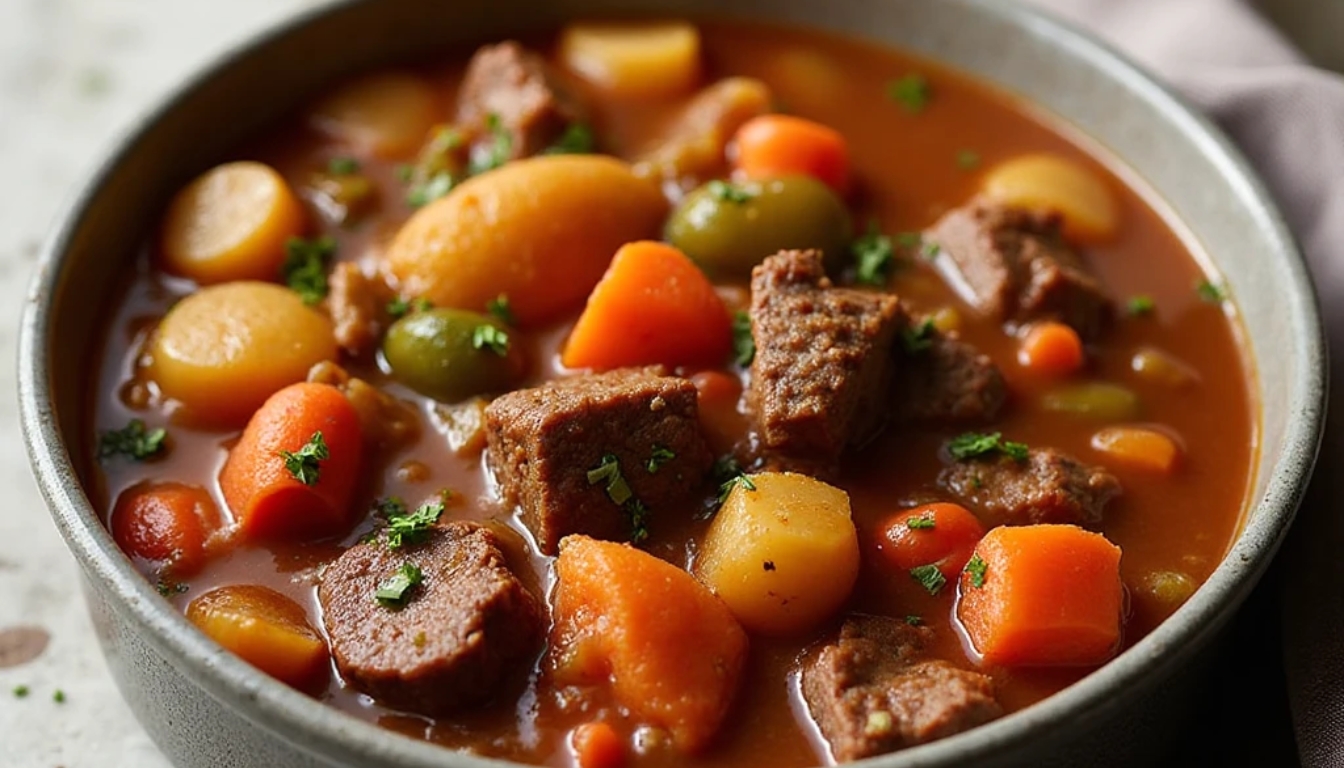Winter nights are the perfect time for something warm and cozy. My grandmother’s beef stew recipe is a family favorite. It turns simple ingredients into a meal that warms your soul.
Every spoonful of this stew brings back memories of family gatherings. We’d all gather around, enjoying steaming bowls of savory goodness.
This easy beef stew recipe is more than just a meal. It’s an experience. Imagine tender beef and robust vegetables simmering together. This creates a broth that satisfies your hunger.
Whether you’re a busy home cook or enjoy cooking on weekends, this recipe is for you. It promises satisfaction without complicated steps.
Table of Contents
Understanding the Perfect Beef Stew
Making the best beef stew is an art. It combines rich flavors, tender meat, and hearty ingredients. A great stew turns simple ingredients into a comforting meal that warms you up.

The secret to a great beef stew is in its ingredients and cooking method. You aim to create deep, layered flavors that make each spoonful unforgettable.
What Makes a Great Beef Stew
A perfect hearty beef stew needs a few key things:
- Tender, well-marbled meat that becomes melt-in-your-mouth soft
- Rich, deeply flavored broth
- Perfectly cooked vegetables that retain their texture
- Balanced seasoning that enhances without overwhelming
Key Ingredients Overview
The base of an outstanding beef stew is quality ingredients:
| Ingredient Category | Recommended Choices |
|---|---|
| Meat | Beef Chuck Roast, cut into 1-inch cubes |
| Vegetables | Carrots, potatoes, onions, celery |
| Liquids | Beef broth, red wine, tomato paste |
| Seasonings | Thyme, bay leaves, garlic, salt, pepper |
Nutritional Benefits
Your best beef stew is not just tasty—it’s also nutritious. Packed with protein from beef, vitamins from vegetables, and essential minerals, it’s a balanced, nourishing meal that supports health.
By grasping these core principles, you’ll make your beef stew go from good to great. It becomes a dish that’s both satisfying and healthy.
Essential Ingredients for Traditional Beef Stew Recipe

Making a tasty traditional beef stew needs the right ingredients. These ingredients blend to create deep, rich flavors. Your stew becomes a hearty meal with the right parts.
The key to a great stew is using top-notch ingredients. Each piece adds to the flavor and taste.
- Meat Selection: Beef chuck roast (ideal for slow cooking)
- Vegetables:
- Yukon Gold potatoes
- Carrots
- Onions
- Garlic
- Liquid Base: Beef broth
- Flavor Enhancers:
- Tomato paste
- Worcestershire sauce
Using fresh, quality ingredients makes your stew better. Freshness matters!
| Ingredient Category | Recommended Quality | Purpose |
|---|---|---|
| Beef | Well-marbled chuck roast | Tender, flavorful meat |
| Vegetables | Fresh, seasonal produce | Natural sweetness and texture |
| Herbs | Fresh or high-quality dried | Aromatic complexity |
Choosing the right ingredients makes your stew unforgettable. Your hard work in picking quality ingredients will be clear in every bite.
Choosing the Best Cut of Meat for Your Stew
Choosing the right meat is key to a tasty homemade beef stew. The meat’s quality affects the dish’s texture, flavor, and success. Knowing the different beef cuts is essential for a memorable meal.
For a homemade beef stew, some cuts are better than others. The chuck roast is the top pick. It’s loved for its rich marbling and amazing flavor when slow-cooked.
Chuck Roast vs Other Beef Cuts
Chuck roast is the best for beef stew. It has:
- High fat content that melts during cooking
- Exceptional tenderness when slow-cooked
- Deep, robust flavor
Meat Preparation Techniques
Preparing your beef for stew needs careful steps. Here’s how to get the best results:
- Trim excess fat, leaving some for flavor
- Cut meat into uniform 1-inch cubes
- Pat meat dry before seasoning
Quality Indicators for Beef Selection
| Quality Indicator | What to Look For |
|---|---|
| Marbling | White fat streaks throughout the meat |
| Color | Bright red with minimal brown spots |
| Texture | Firm with slight moisture |
While chuck roast is the top choice, other cuts like bottom round and pot roast can also make a great stew. They just need the right preparation.
Kitchen Equipment and Tools Needed
Preparing a delicious beef stew recipe needs the right kitchen equipment. The right tools make cooking smoother and more fun. You want versatile, high-quality tools to make a perfect meal.
Essential equipment for your beef stew recipe includes:
- Dutch Oven or Heavy-Bottomed Pot: The key for making beef stew. Cast iron or enameled cast iron options are best for heat distribution.
- Sharp Chef’s Knife: Important for cutting meat and vegetables precisely
- Cutting Board: A sturdy wooden or plastic board is best
- Measuring Cups and Spoons: For accurate ingredient amounts
- Large Wooden Spoon or Silicone Spatula: For stirring and mixing
Your cooking vessel is key for deep flavors. A Dutch oven is best for beef stew because it keeps temperature steady. It’s great for stovetop and oven cooking. If you don’t have a Dutch oven, a large, heavy-bottomed pot works well.
More tools can make your beef stew recipe even better:
- Slow Cooker: For easy, long, slow cooking
- Pressure Cooker: Cooks faster
- Meat Thermometer: For perfect meat doneness
Quality kitchen tools can turn your beef stew recipe into something amazing. Choose tools that feel right and match your cooking style.
Beef Stew Recipe: Step-by-Step Instructions
Making an easy beef stew recipe needs careful prep and attention. This guide will help you make a delicious, hearty stew. It will warm your family’s hearts and fill their bellies.
Starting a perfect beef stew recipe means choosing the right ingredients and mastering cooking techniques. Breaking it down into steps ensures a tasty meal every time.
Seasoning and Flouring the Meat
The base of a great beef stew is well-seasoned meat. Here’s how to add lots of flavor:
- Pat the beef chunks dry with paper towels
- Season generously with kosher salt and freshly ground black pepper
- Coat meat pieces in all-purpose flour, shaking off excess
- The flour helps create a golden crust and thickens the stew
Browning Techniques
Browning meat is key for deep, rich flavors in your stew. Here are some tips:
- Use a heavy-bottomed Dutch oven or large skillet
- Heat oil until shimmering but not smoking
- Brown meat in small batches to avoid overcrowding
- Aim for a deep golden-brown crust on each piece
Adding Vegetables and Liquid
After browning the meat, it’s time to add layers of flavor:
- Sauté onions, carrots, and celery in the same pan
- Deglaze with red wine or beef broth to capture fond
- Add beef back to the pot with additional liquid
- Include herbs like thyme and bay leaves for depth
By following these steps, you’ll make an easy beef stew full of flavor. It’s sure to become a family favorite.
Cooking Methods and Times
Preparing a delicious slow cooker beef stew requires understanding different cooking methods. Each technique brings unique flavors and textures to your dish. This allows you to create a perfect meal based on your time and kitchen equipment.
Your cooking method dramatically impacts the tenderness and depth of flavor in your slow cooker beef stew. The right approach ensures meat becomes melt-in-your-mouth tender. It also develops rich, complex tastes.
| Cooking Method | Temperature | Cooking Time | Best For |
|---|---|---|---|
| Oven Braising | 325°F | 2-2.5 hours | Even heating, deep flavor development |
| Stovetop | Low Simmer | 60-90 minutes | Quick preparation, direct heat |
| Slow Cooker | Low/Medium/High | 6-10 hours | Hands-off cooking, maximum tenderness |
| Instant Pot | High Pressure | 35 minutes | Rapid cooking, retained nutrients |
When making slow cooker beef stew, consider these cooking method recommendations:
- Slow cooker method produces the most tender meat
- Oven braising provides consistent temperature control
- Instant Pot offers fastest cooking time
- Stovetop works best for smaller batches
Select your cooking method based on available time and desired texture. Low and slow techniques typically yield the most flavorful and tender slow cooker beef stew results.
Secret Tips for Rich and Flavorful Broth
Making a great beef stew with red wine is more than just mixing ingredients. It’s about creating deep, complex flavors. These flavors turn a simple dish into a true masterpiece.
Selecting the Perfect Wine
Your wine choice is key when making beef stew with red wine. Pick dry red wines with strong flavors:
- Cabernet Sauvignon
- Merlot
- Burgundy
- Côtes du Rhône
Don’t use cooking wines. They have too much salt and lack real taste. Choose a wine you’d like to drink. The quality of the wine will affect your stew’s flavor.
Herb Combinations for Depth
Use herbs to enhance your beef stew and match the red wine’s richness:
- Fresh thyme adds earthy undertones
- Rosemary brings aromatic complexity
- Bay leaves provide subtle background notes
- Sage enhances the meat’s natural flavors
Mastering Broth Thickening Techniques
Getting the right consistency in your stew is important. You can thicken your broth in three ways:
- Flour dredging before browning meat
- Cornstarch slurry near end of cooking
- Liquid reduction for concentrated flavors
Pro tip: Add your thickening agent slowly and stir well. This prevents lumps and gives your stew a smooth, rich texture.
Slow Cooker and Instant Pot Variations
Turning your beef stew recipe into a slow cooker or Instant Pot version makes cooking easier. Each method has its own benefits for a tasty slow cooker beef stew that suits your life.
Slow Cooker Beef Stew Method
Using a slow cooker for beef stew means tender, flavorful meat with little effort. The slow cooking breaks down tough meat, making it soft and delicious.
- Set slow cooker to low heat for 9-10 hours
- Or use high heat for 6-7 hours
- Prepare ingredients the night before for an easy start
Instant Pot Beef Stew Technique
If you want a quicker way, the Instant Pot is great for slow cooker beef stew. It cooks fast while keeping flavors rich.
- Cook at high pressure for 35 minutes
- Let it rest for 10 minutes
- Great for quick weeknight meals
No matter the method, the secret is to arrange ingredients well and season right. This way, your slow cooker beef stew will wow everyone.
Storage and Reheating Guidelines
Keeping your homemade beef stew fresh is key. After making a delicious batch, you’ll want it to stay tasty for later meals.
Refrigeration Techniques
Store your stew in an airtight container in the fridge. Here are some important tips:
- Cool the stew completely before storing
- Use shallow containers to help rapid cooling
- Refrigerate within 2 hours of cooking
- Store for up to 3 days in the refrigerator
Freezing Your Beef Stew
Freezing is a great way to keep your stew fresh longer. Here are some freezing tips:
- Use freezer-safe containers or heavy-duty freezer bags
- Leave some space at the top for expansion
- Label containers with the date
- Freeze for up to 3 months
Reheating Methods
There are several ways to reheat your stew:
- Stovetop method: Reheat on low heat, stirring occasionally
- Microwave method: Use medium power, stirring every 30 seconds
- Add a splash of broth if the stew seems too thick
- Ensure internal temperature reaches 165°F for food safety
Pro tip: Thaw frozen stew in the fridge overnight. This will help it reheat better and taste fresher.
Common Mistakes to Avoid
Making the best beef stew is more than just a recipe. Many home cooks face common mistakes that can ruin a meal. Knowing these mistakes helps you make a perfect beef stew every time.
Mastering beef stew means focusing on key details. These details can make or break your meal. Let’s look at the most common errors and how to steer clear of them.
Temperature Control Challenges
Managing temperature is key when making the best beef stew. Cooking too hot can lead to:
- Tough, chewy meat
- Burnt outside with raw inside
- Less tender meat
Seasoning Mistakes
Seasoning right can turn a simple beef stew into a masterpiece. Here are common seasoning errors to avoid:
- Not seasoning the meat before browning
- Adding all spices at once
- Not tasting and adjusting seasonings
Texture Problems to Watch
Getting the right texture in your beef stew is all about technique. Be careful of:
- Overcooking veggies to mush
- Using lean meat that dries out fast
- Skipping the meat browning step
By knowing and avoiding these mistakes, you’ll make a rich, flavorful beef stew. It will impress your family and friends.
Serving Suggestions and Side Dishes
Turn your winter beef stew into a special meal with the right sides. Choose sides that balance the stew’s rich flavors. This will make your meal more enjoyable.
Perfect Pairings for Your Beef Stew
- Crusty Bread: A warm, crusty baguette or sourdough is perfect for soaking up the gravy
- Creamy Mashed Potatoes: They offer a smooth, comforting base for your stew
- Fresh Green Salad: It adds a light, crisp contrast to the stew
Think about these garnishes to add flavor and beauty to your stew:
- Chopped fresh parsley
- Grated Parmesan cheese
- A dollop of sour cream
Beverage Recommendations
| Beverage Type | Best Pairing |
|---|---|
| Red Wine | Cabernet Sauvignon or Merlot |
| Beer | Dark ale or stout |
| Non-Alcoholic | Rich, full-bodied red grape juice |
Your hearty beef stew should be the main attraction. With the right sides and drinks, you’ll have a meal that warms your heart and soul.
Conclusion
Traditional beef stew is more than a meal; it’s a journey that links generations. It brings together rich, comforting flavors. By mastering the basics, you can turn a simple recipe into a memorable experience.
Your success in making a traditional beef stew comes from choosing quality ingredients and using the right cooking methods. It also helps to be creative. Whether you’re new to cooking or have years of experience, this dish is a great way to improve your skills.
Slow cooking is an art. Try different herbs, meats, and vegetables to find your own unique flavors. Every time you make a traditional beef stew, you get better and discover new tastes. Cooking is about passion, creativity, and sharing great meals with loved ones.
With time and effort, you’ll make a beef stew that your family will love. Start your cooking journey today. Discover the joy of making a timeless, hearty meal that everyone will enjoy.
Tried Our Recipe Yet?
There are no reviews yet. Be the first one to write one.

